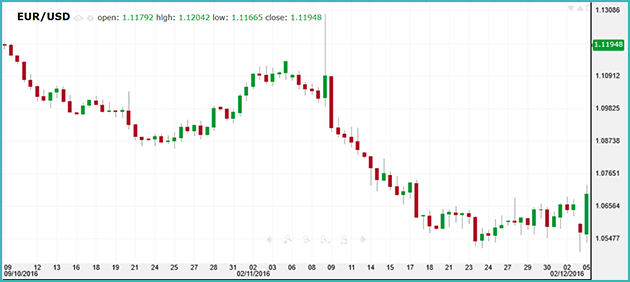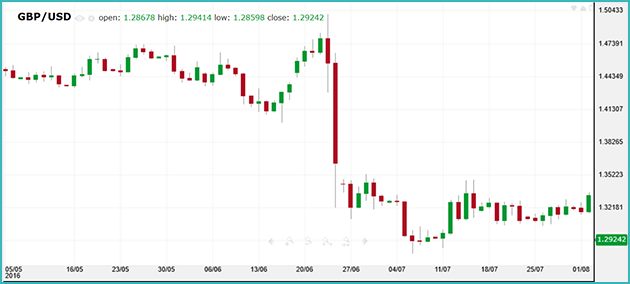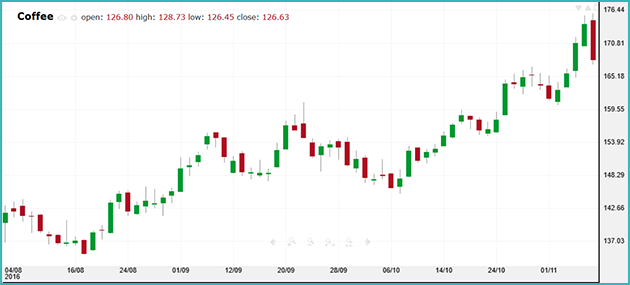This website uses cookies and is meant for marketing purposes only.
Get in touch
- Home
- Getting Started
- Trading
- Promotions
- Our Company
If you are a fan of Technical Analysis, trend lines and charts, this is NOT the article for you. Today’s article is all about Fundamental Analysis, or – to be more specific – about some surprising factors that could impact the market. As you probably know, for online traders information is power and by learning about the factors that affect the market, you can gain a better understanding of potential price movements and make smarter, more informed trading decisions.
Okay, enough intro for now. Let’s get down to business…
Before we begin with the less obvious factors, let’s mention the two obvious ones: Supply and demand. Anything that is bought or sold – be it gold, a house or the US Dollar – is subjected to the power of supply and demand. When the supply increases, surpassing demand, the price will usually decrease. When the demand rises, surpassing supply, the price will usually increase. In theory, demand and supply will battle until they reach an economic equilibrium. This is the point where the quantity demanded (at a specific price) will equal the quantity supplied (at the same specific price).
Want a visual explanation? Sure you do…
Didn’t like the seesaw? Well, here’s an example. Let’s say OPEC nations produced more oil than expected. The market is full of oil. What will happen to the price? That’s right: It will likely decrease. Now let’s say OPEC nations pumped less oil than expected. What will happen? That’s right, oil prices will likely rise.
Now we wish we could tell you that this is the whole story. It really isn’t. First of all, there are many factors that affect supply and demand – either directly or indirectly. We will now discuss some interesting and less-known factors that are involved in trading and that fundamental analysts keep in mind while making trading decisions.
Feel like we’re going too fast? Visit our Getting Started page to cover the basics.
One of the factors that can have an immediate impact on global markets are elections. This is especially true when the election is for a major economic power such as the US, Germany, UK or Japan.
Market volatility can begin weeks or even months before the election and can be fueled by major surveys or statements. Events related to the election – such as the announcement of a legal investigation relating to a specific candidate or party – can also have a direct impact on market volatility. Often, volatility begins well before Election Day and it can rise even after the announcement of the winner, especially if the results are viewed as surprising.
Want an example? Well, thanks to President Donald Trump we have a great one. His victory in the US Presidential Election in 2016 was pretty unpredictable and caught the market by surprise. What happened? Well, just look at the chart below, featuring the EUR/USD. When the results were first announced, uncertainty swept through global markets and the USD fell. A few hours later though, investors have recalculated the possibly beneficial effects of having a Republican, pro-business President and the Dollar bounced back.

You might think that such events are useless, since - after all – the Dollar’s fall was followed by a quick increase. But remember: For online investors, any change in price can be viewed as an opportunity. You can always choose to short or long your position, potentially taking advantage of any change in price. Traders who opened and closed their deals at the right time, could have benefitted from this temporary drop and surge.
If you like to learn more about different strategies traders employ, view our Technical Analysis page or learn about Market Sentiment.
Politics and money are closely related, and in this case, we’re not talking about lobbying and corruption. Just like election, the market often reacts to major political events, especially if the event in question is surprising or focuses on a major economic power.
What political events can affect the market? Here are just a few examples:
Such events can ignite volatility – sometime weeks or even months before the actual event takes place. For a relatively recent example, just take a look at the UK referendum which took place on June 23rd 2016. The surprise decision to leave the EU caught global markets by surprise. On June 24th, the British Pound crashed against the US Dollar.


Publically-traded companies and governments regularly release periodical reports, revealing their financial performances. Investors wait to see how well – or how poorly - a specific country – or company – is doing and use this information when making trading decisions. Often, you can see volatility before, during and after such reports are released – especially if the report doesn’t meet market expectations.
Important: The data in the reports should always be viewed in comparison to the market’s estimations. If a company released a favorable report, but not as good as the market expected, this could still be viewed as a disappointment and the share could decrease.
Keep in mind that while we call these ‘reports’, in some cases, the information is communicated via an announcement or a press conference.
Here are just a few examples of major economic reports that can impact the market.
For the most part, the factors mentioned above fall under the category of fundamental analysis. Want to know more? Check out our Fundamental Analysis Overview.

Just like the reports, major meetings take place regularly and are followed by announcements or press conferences where important data is communicated. Central banks, organizations and countries can all make announcements that can surprise or affect the market. Keep in mind that major events such as interest rate announcements can often be surrounded with volatility – before, during and after - potentially creating opportunities for alert investors.
Here are just a few examples of meetings and announcements that traders might find interesting…

Many investors look for hints regarding what a specific government or company is planning to do. Why? Because they are trying to ‘stay ahead of the market’ instead of reacting to an event that everybody else knows about. Many policy-makers actually spread hints on purpose, offering indications regarding their possible decision.
Let’s look at an example. Fed Chair Janet Yellen has been known to use specific terminology indicating the Fed’s sentiment regarding interest rate hike. In March 2015, she dropped a single word from her statement ‘patient’, and it was all over the financial news. You see, some people saw it as an indication that the Fed was getting ready to raise interest rates (which it did, but only months later).
Remember: As with any market event, the important thing isn’t what actually happens, but how investors perceive it.
Wait… what? The weather can impact global markets? In more ways than one. We might like to see the economy as some abstract occurrence taking place in stock markets and online, but the economy is greatly affected by natural events and the weather is one of the most influential factors of all.
Here are just a few examples…
Agricultural commodities
We hope we don’t need to tell you that the so-called ‘soft commodity market’ is greatly influenced by the weather. When dealing with tradable CFD instruments such as coffee, sugar, corn or cotton, any change in weather can mean a change in price. A drought, a storm, unusual heat or frost – any weather conditions that are out of the ordinary can impact supply. On the other hand, favorable weather conditions can result in excessive supply, also potentially impacting price.
Remember: Very often the market will react even before supply is actually affected, responding to news regarding possible disruption of supply.
Here’s a quick example…
Nearing the last quarter of 2016, Brazil’s coffee belt was inflicted by very dry weather. This was seen as a possible threat to of the supply of both Arabica and Robusta coffee beans. What happened to the price of coffee? See below…

To learn more about agricultural commodities and the factors that can affect them, visit our Commodity Trading page.
Important: When the weather impacts the supply of commodities, it can also impact companies that use them. For example, a change to the price of sugar, could potentially impact the share price of companies that rely on sugar, such as Coca-Cola.
Want to view our full list of tradable instruments? Check out our Trading Conditions page.
Energy usage
What happens when the winter is extremely cold? That’s right: People in western countries use more energy to heat up their homes and businesses. What happens when the winter is particularly mild? People use less energy. It might sound trivial, but a warm winter can have a major impact on energy consumption in developed countries, affecting energy companies and even the price of specific energy commodities.
Snow day disturbances
The impact of major snow storms is not limited to agriculture. They can affect a whole country’s productivity, interfere with communication and transportation, disrupt industries and delay projects. Furthermore, there is some data suggesting that during major snow days, daily trading volume in relevant stock markets decreases.
Climate changes
We don’t like to deal with doomsday speculations, but there are many economists who suggest that climate changes – if they progress as expected – could create massive economic damages. Potential impact could include decreased GDP, increased health costs and, of course, major interference with agriculture and food supply.
A quick intro to weather derivatives
Let’s take a minute to discuss weather derivatives – and we do mean a minute. This is just a taste, and if you want to cover this topic in-depth, you will need to do some additional reading.
Now, as we’ve just demonstrated, weather can impact many aspects of the economy. What can large companies do to protect themselves? Insurance only offers protection from real catastrophically and fairly rare events, but even mild disturbances can affect companies’ profits. This is why large companies often use 'Weather Derivatives', which essentially allow them to hedge against weather-related losses. Investors who sell these derivatives agree to bear this weather-related risk and receive a premium in exchange. If nothing goes wrong, the investor profits. If the weather is bad, the company who bought the derivative can receive a predefined financial compensation.
In simple terms, weather derivatives actually turn weather into a kind of commodity, allowing investors to trade it.
Okay, we know, no one wants to think about natural disasters as a trading opportunity, but in all honesty – they are. They don’t have to be catastrophic of course. A tornado, a flood, an earthquake, a serious storm or a volcanic eruption can all have economic consequences. Want an example? Let’s look at the 2010 eruptions of Eyjafjallajökull in Iceland. It was fairly small for a volcanic eruption, but it caused substantial disruption to air travel across western and northern Europe in April 2010, affecting numerous airlines and related businesses. Now, before we continue, let’s hear you say Eyjafjallajökull fast, three times.

How can something like a holiday impact the price of currencies, commodities, shares, ETFs and indices? There are a few examples.
Holiday traditions
Let’s take Easter for example. According to the National Retail Federation, nearly 90% of US consumers celebrate Easter by buying sweets for an estimated cost of $2.6 billion. Lower or higher than usual sales could potentially impact companies such as Nestle or commodities such as sugar or cocoa.
Want another example? Diwali, the Hindu festival of lights, traditionally includes gold gifts. It has been historically connected with a strong demand for gold in India, one of the world’s leading consumers of the precious metal.
Shopping
Specific holidays – both traditional ones such as Christmas for example and modern ones such as Black Friday and Cyber Monday - are closely connected to an increase in retail and online sales. Holiday season sales can potentially ‘make or break’ a large company’s quarterly results.
Holiday joy
As we’ve mentioned several times in this article, the market is composed of individual investors, so it is affected by psychology. One example is the so-called ‘Santa Claus rally’, which is a historical rise in the price of shares during the last week of December and the first couple of trading days in January. One of the common explanations for this phenomenon (which doesn’t always occur) is general feeling of joy around Wall Street. That said, there are other possible – and more practical – reasons, including Christmas bonuses and tax considerations.
In order to recognize market opportunities and make smart trading decisions, you need to be aware of the various factors that could impact the different CFD instruments you trade. Yes, we know, it sounds like a lot of information to cover, but with a bit of practice and daily analysis, you’ll quickly improve both your knowledge and your trading skills.
Join iFOREX to get an education package and start taking advantage of market opportunities.